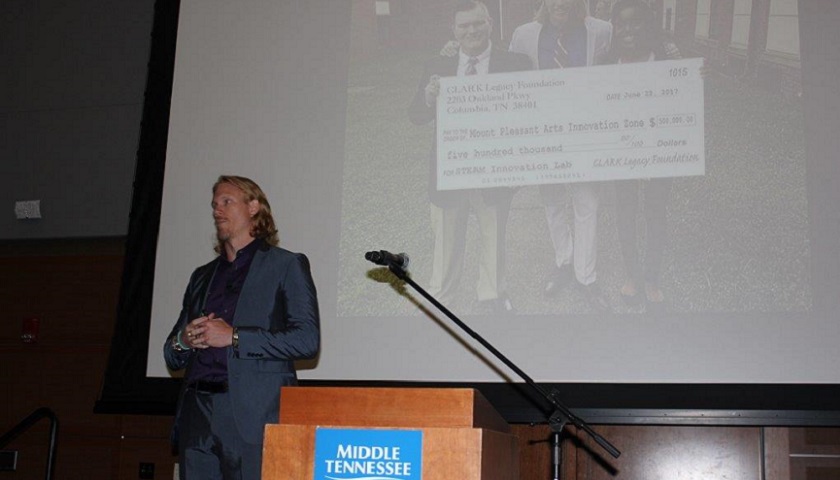I was recently privileged to hear one of the finest and most passionate speeches on public education presented by Dr. Ryan Jackson. I admit that his speech fueled my creativity and passion for education, as well as made me feel a little guilty that I am not doing enough.
Ryan just shifted from an assistant principal at a large metropolitan high school in Nashville to the executive principal of a small rural high school in Maury County. The children in Maury County just gained an incredible advocate who will help them quench their thirst for knowledge. At the same time, the teachers gained a leader who will allow them to innovate and push their own boundaries, while parents and taxpayers just found a champion who will bring a consumer-first mentality to the job. Maury County is on the rise.
When Ryan first came to my attention, his focus was on creating “a new era of school leaders needed to usurp a century-long, archaic education paradigm, using fearless innovation, radical ideas and, above all, an unbridled passion to lead change.” Metro-Nashville Schools used to have a group of what I called the “Young Lions,” leaders who were determined to reject excuses. I would name them all, but do not want to miss any, so suffice to say Ron Woodard and Ryan Jackson were two of my favorites.
Ryan discussed his first-hand experience watching “how the effect of our industrial-age school model was stomping out any remnants of joy in what we were currently calling school.” Determined to spark change, Dr. Jackson is now testing “the impact and paradigm-shift qualities of STEAM as a holistic learning model, where students are taught to think as creators, not merely consumers.” To operate in a school system in which this freedom is granted is rare. Too many Superintendents of Schools claim they support site based decision making, but in reality still practice the top down management style that is killing public education.
Ryan Jackson wrote and I cannot say it any better:
I rolled the dice and wagered my professional career and family’s future on the lofty goals of a forward-thinking district led by an atypical superintendent, who positioned this school system more like an inspired start-up company than a stagnant corporate giant.
Only a month into the 2016-2017 school year and we’ve already erected a symbolic statue of the No Child Left Behind (NCLB) paradigm that has devastated curriculums across this great country of ours for the past two decades. This pyre of misaligned standards, hurtful protocols, over-testing and empathy-less remediation stands reminiscent to the towering Wooden Man effigy burned annually to represent radical self-expression.
Now it’s time to throw the match…
Jackson is himself atypical. And we need more leaders just like him to break out of the industrial-age education model that has trapped our children and teachers in an outdated system. Still I am hopeful.
In an age where technology is at our fingertips, Jackson beautifully stated the problem. “The most puzzling, if not scariest, irony is our unfathomable commitment to an industrial-age education model that has stood now for more than 100 years.” He added, “Our devices update every six months (if not sooner), our children learn to swipe before they learn to crawl, and our ability to connect with one another has created a boundless classroom, where pen pals are now virtual classroom companions.”
The Age of the Underdog is not at some distant point in the future. It will not be led by Republicans or Democrats. It will be championed by classroom teachers who have been given the freedom to make changes to serve the needs of their students. Organizations such as Professional Educators of Tennessee support our members in their vision and provide the platform where educators can share their visions, ideas and talents with each other. Our professional development is second to none, and geared toward the modern educator.
Ryan Jackson and his team created the nation’s very first K-12 public school STEAM campus in Maury County, Tennessee. Mt. Pleasant High School in Mt. Pleasant, Tennessee is what is possible when you do not limit the dreams and abilities of our educators. For more on what is happening at “the Mount” visit Ryan’s website at https://underdogsadvocate.com/
Even though test scores are not the primary goal, they are way up across the board and climbed one-half of a point on the ACT in one year. I think a lot of candidates for Governor, legislators, school board members and beyond will be making the trek to Mt. Pleasant in the next few years.
And while you’re there, stop in at the Mt. Pleasant Grille for some great southern food. Tell them JC Bowman sent you.
– – –
JC Bowman is the Executive Director of Professional Educators of Tennessee, a non-partisan teacher association headquartered in Nashville, Tennessee. Permission to reprint in whole or in part is hereby granted, provided that the author and the association are properly cited. Follow him on social media via Twitter at @jcbowman.






Mr. Bowman, As always I appreciate your thoughtful responses. I believe that we are on the same page. I only desired to emphasize the continued requirements of personal interaction and fundamental educational skills. New methods are not always better methods. We need to be diligent in evaluating the end product. It appears to this lay person that the educational circle can get caught up in being innovative in the classroom and fail to actually convey knowledge to the student. I am appreciative of you efforts and your commentary.
I am all for using technology, in fact my career has always been in the ever-evolving IT arena. But it is a sad statement on our current culture when two people sit at the same table and never converse unless it is by cell phone messaging. That may not sound like it applies to the classroom but building real, not just virtual personal relationships has not lost its importance. I am for classroom innovation, but not at the expense of a solid fundamental education. It does not matter if one knows how to swipe or click if they cannot think nor retain knowledge. As a product of the “industrial-age education model” I found much room for innovation and creative thinking. The teacher in the classroom is the catalyst for making this happen. My favorite high school math teacher (a Rhodes Scholar) told us that he did not care how we arrived at the correct answer even if we had to take our shoes off to count on our toes. But he did expect us to arrive at the correct answer. That is creative thinking. Let’s not throw the baby out with the bath water.
We are missing human interaction because of technology. STEM did not fully address that. However, the logic is simple: the wave of future economic prosperity lies in a workforce that is well-versed in rising job markets like science, technology, engineering and math. STEAM is a way to take the benefits of STEM and complete the package by integrating these principles in and through the arts. STEAM takes STEM to the next level: it allows students to connect their learning in these critical areas together with arts practices, elements, design principles, and standards to provide the whole pallet of learning at their disposal. STEAM removes limitations and replaces them with wonder, critique, inquiry, and innovation. And yes, the basics are a prerequisite.